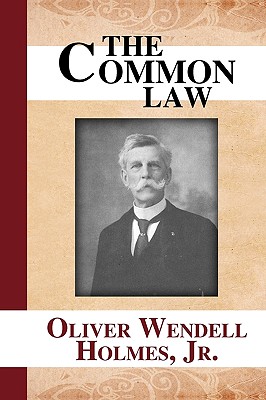The Common Law

The Common Law
A decisive influence on sociological jurisprudence, legal realism and the general development of Anglo-American law in the twentieth century. Rejecting the reigning positivist ethos of the nineteenth century, Holmes proposed that the law was not a science founded on abstract universal principles but a body of practices that responded to particular situations. This functionalist interpretation led to his radical conclusion that law was not discovered, but invented. This theme is announced at the beginning of Lecture I: The life of the law has not been logic: it has been experience. The Common Law was easily the most distinguished book on law by an American published between 1850 and 1900. Lawrence M. Friedman, A History of American Law It is a book of large proportions, from whichever side approached. (...)We cannot close without expressing again our admiration of a book which is so ingenious and so temperate; so rich in learning, thought, argument, and brilliant intuitions. American Law Review [Holmes's] brilliant exposition, as effective on English scholarship and legal thinking as on American, of the true nature of law both as a development from the past and an organism of the present, blew fresh air into lawyer's minds encrusted with Blackstone and Kent. Percy Winfield, Chief Sources of English Legal History One of the greatest jurists of the twentieth century, Oliver Wendell Holmes, Jr. [1841-1935] was educated at Harvard College and Harvard Law School. Admitted to the Massachusetts Bar in 1867, he was equally active as a practitioner and scholar. He edited the American Law Review (1870-78), produced an edition of James Kent's Commentaries on American Law (1873) and delivered the lectures that formed the basis of The Common Law. Published in 1881, this book established Holmes's reputation. After teaching briefly at Harvard Law School he was appointed Associate Justice of the Massachusetts Supreme Judicial Court in 1882. Chief Justice of that court from 1899 to 1902, he was then appointed Associate Justice of U.S. Supreme Court, a position he held until the end of his life. Known as The Great Dissenter in the early years of his career because of his frequent opposition to the Court's conservatism, he went on to become of the most influential justices in its history. His opinions are cited frequently today and are highly esteemed for their intellectual depth and elegant composition.
PRP: 212.62 Lei
Acesta este Pretul Recomandat de Producator. Pretul de vanzare al produsului este afisat mai jos.
191.36Lei
191.36Lei
212.62 LeiLivrare in 2-4 saptamani
Descrierea produsului
A decisive influence on sociological jurisprudence, legal realism and the general development of Anglo-American law in the twentieth century. Rejecting the reigning positivist ethos of the nineteenth century, Holmes proposed that the law was not a science founded on abstract universal principles but a body of practices that responded to particular situations. This functionalist interpretation led to his radical conclusion that law was not discovered, but invented. This theme is announced at the beginning of Lecture I: The life of the law has not been logic: it has been experience. The Common Law was easily the most distinguished book on law by an American published between 1850 and 1900. Lawrence M. Friedman, A History of American Law It is a book of large proportions, from whichever side approached. (...)We cannot close without expressing again our admiration of a book which is so ingenious and so temperate; so rich in learning, thought, argument, and brilliant intuitions. American Law Review [Holmes's] brilliant exposition, as effective on English scholarship and legal thinking as on American, of the true nature of law both as a development from the past and an organism of the present, blew fresh air into lawyer's minds encrusted with Blackstone and Kent. Percy Winfield, Chief Sources of English Legal History One of the greatest jurists of the twentieth century, Oliver Wendell Holmes, Jr. [1841-1935] was educated at Harvard College and Harvard Law School. Admitted to the Massachusetts Bar in 1867, he was equally active as a practitioner and scholar. He edited the American Law Review (1870-78), produced an edition of James Kent's Commentaries on American Law (1873) and delivered the lectures that formed the basis of The Common Law. Published in 1881, this book established Holmes's reputation. After teaching briefly at Harvard Law School he was appointed Associate Justice of the Massachusetts Supreme Judicial Court in 1882. Chief Justice of that court from 1899 to 1902, he was then appointed Associate Justice of U.S. Supreme Court, a position he held until the end of his life. Known as The Great Dissenter in the early years of his career because of his frequent opposition to the Court's conservatism, he went on to become of the most influential justices in its history. His opinions are cited frequently today and are highly esteemed for their intellectual depth and elegant composition.
Detaliile produsului









